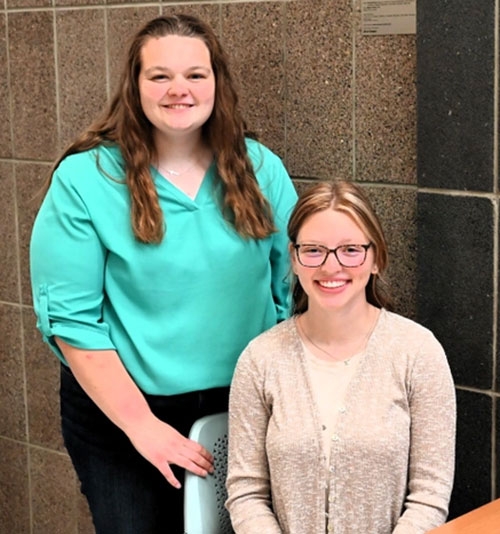You are here
Home ›Learning how to ace university life: Learning communities at Iowa State University for different degrees help freshmen transition to college life

Mentoring partnership ... Iowa State University senior Madalyn Palmer (left) has served as a mentor for freshmen in the College of Agriculture’s learning community, including Ashlyn Hammel during her first year. Submitted photo.
Editor’s Note: The following article was originally printed October 6, 2023 in Wallaces Farmer. It is being reprinted here with permission granted by editorial staff of that publication. The article features Waukon High School 2021 graduate Madalyn Palmer, currently a senior student at Iowa State University in Ames, and Spring Grove, MN High School 2022 graduate Ashlyn Hammel, who is currently a sophomore at Iowa State University.
Helping new students be successful in a new environment is exactly what the ACES program is doing at Iowa State University (ISU).
ACES stands for Agricultural Community Encourages Success and provides ISU freshmen with a residential learning community for about 50 students of an agricultural major. By applying and being accepted into the program, 25 females and 25 males live in a similar space in Maple Hall in the dormitories in Ames.
“It’s really a learning community to give students a chance to have activities together and become educated at the same time,” says Madalyn Palmer, a senior in animal science who serves as a mentor in the group. Palmer along with other upperclassmen help the freshmen with whatever they might need.
“Some need help in class, others with their cover letter and resumé, and some are just homesick, so I talk them through that,” Palmer says. “Or they just want someone to talk to when they do good or bad on an exam.”
Mentorship helps with student comfort
Ashlyn Hammel, a sophomore in animal science, says she met several people while in the ACES program whom she probably wouldn’t have otherwise in her first year at ISU. “It gave me a chance to lean on my peers and mentors to get used to being at Iowa State, since I really didn’t know anyone here when I came,” she says. “The group really made my transition easier when I came to college.”
That’s exactly why groups such as ACES was formed at ISU. Besides the general agricultural group, there’s one for those majoring in agricultural education, engineering, computer science, design, natural resources and technology, as well as others.
Each group has a general housing area with regular activities for fun and learning. Palmer says they will get together and watch a movie, hear from a guest speaker, or work on cover letters and resumés. Mentors have four to five hours in the office each week to meet with students. But Palmer says she will also meet with “the rookies” outside of that time.
“Many times, they want to talk out their four-year plan for college, especially if they have a goal for schooling beyond their bachelor’s degree,” she says. “They could go talk to their adviser, but sometimes it’s easier to talk to someone their own age.”
Palmer says she has talked through a school plan with Hammel, who wants to attend veterinary school.
“Getting involved in ACES has been a good resource for me and helped me become more comfortable with being at such a large university,” Hammel says.
Getting signed up for ACES
Palmer says it’s important to sign up for ACES as soon as possible after acceptance into the university. Hammel checked the box to be in the learning community as soon as she filled out the housing application. By signing up early, even before graduating from high school, she was able to request her dormitory preference.
Some of the people in ACES will request a specific roommate based on social media groups for the program. Hammel chose to go with the luck of the draw for roommates, knowing they would have many things in common as they have similar majors and classes, which often means they have similar backgrounds.
The program lets students enroll in common sections of several classes each one will have to take, letting them work and study together.
“Overall, we want to foster community and help with the transition to college life,” Palmer says. “When prospective students visit campus, they hear about all these learning communities, and we hope to be able to continue this program for many years.”
For more information on ACES, visit ISU’s Division of Student Affairs.

